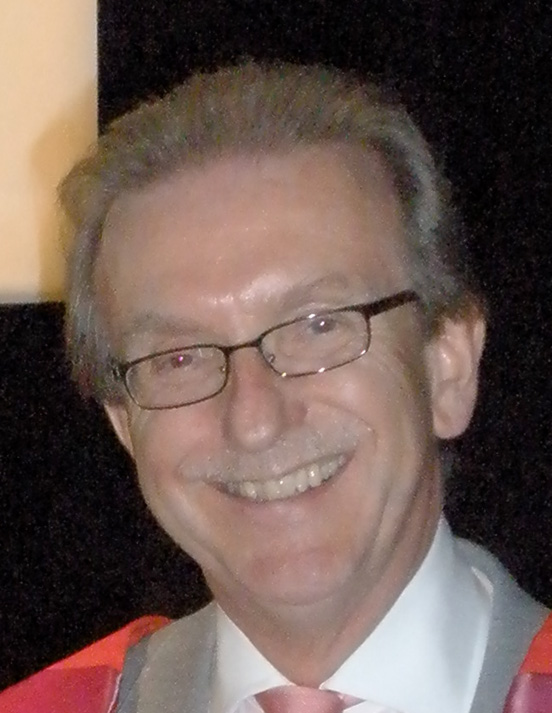
David Andrew Moffat 1947 - 2020
One of the most distinguished figures in world Otology and Neuro-otology , David Andrew Moffat died on 18th March. He had made what appeared to have been a full recovery treatment for carcinoma of the prostate, only to develop a second primary in his chest some 5 months ago. He slipped away in his home hospital, Addenbrooke’s Hospital, Cambridge where he had worked as a consultant for some 40 years. He was 72 years of age.
David was born of Celtic stock on 27th June 1947 in Wales. His mother was Welsh and his father Scottish, and David wore his kilt with pride. The family moved Glasgow to the outskirts of London when he was seven years old. While still at St Nicholas Grammar School in Northwood he made up his mind that he wanted to be doctor and was accepted to study medicine at the London Hospital in the East End of London. He obtained a first class honours degree in Biochemistry and qualified in Medicine in 1971. After house jobs he decided that he wanted to pursue a career in Otolaryngology, inspired, like many, by the example of Andrew Morrison.
Whilst working as ENT Registrar at the London he fell in with bad company - Bill Gibson and Richard Ramsden, and the three formed a lifelong friendship as well a close professional interest, based on a mutual fascination with inner ear function, and skull base surgery. Influenced by Bill’s work on electro-cochleography, David contributed important publications on inner ear potentials, in particular the summating potential in Meniere’s Disease. Long evenings were spent together conducting electrophysiological experiments, and once a month a “publication dinner” would be held in their respective homes as the results were prepared for the press. These were heady days.
The London Hospital at that time was the leading British centre for acoustic neuroma surgery. Andrew Morrison, and his neurosurgical colleague Tom King, established a joint approach to the cerebello-pontine angle following the model established by House and Hitselberger in Los Angeles. David, Bill and Richard took the skills learned these maestros to their future careers.
David then spent a period of 6 month in Palo Alto with Mansfield Smith, and this cemented his love for America and American Otology and Neurotology.
On return the States, David was appointed as consultant at the Westminster Hospital in 1980, but that department closed shortly thereafter and he found himself in search of employment. He was soon appointed to Addenbrooke’s Hospital in Cambridge where he built up an outstanding team. He developed a close relationship with his neurosurgical colleagues, firstly David Hardy, then Robert MacFarlane and rapidly established one of the largest Lateral Skull Base practices in the world. Their repertoire embraced acoustic neuromas and NF2, Glomus Tumours and Squamous Cell Carcinomas of the temporal bone, the result of the latter being quite outstandingly good. Meniere’s Disease remained an interest and the effectiveness of saccus surgery remained a question that continually intrigued him. He was also a meticulous middle ear surgeon with an active scientific curiosity into the causes and management of cholesteatoma.
His scientific publications were impressive, amounting some 250 peer reviewed papers, and several chapters and eponymous lectureships. David was a dedicated teacher and over the years developed a long series of Fellows for whom he took paternalistic care, and who in turn spread his gospel to all corners of the globe. He was in great demand as a lecturer all over the world, and participated in numerous surgical courses at home and abroad, of which the annual Nijmegen Course was possibly the one that over the years gave him the greatest pleasure. It was there that he was awarded the Brinkmann Medal and it was there too that his PhD was conferred on him for his thesis on Lateral Skull Base Surgery
He served the ENT community with great devotion, as President of the Section of Otology at the Royal Society of Medicine, of which he was elected to honorary membership, Master of the British Academic Conference of Otolaryngology and the Royal College of Surgeons which awarded him a Hunterian Professorship. He particularly enjoyed his time as Chairman of the Intercollegiate Faculty Board, and the time he served on the Higher Surgical Training Committee(SAC). He was for several years an examiner for the College of Physicians and Surgeons of Glasgow.
David loved America and his many friends and colleagues in the States. He travelled there whenever he could and spoke at numerous meetings. Of the many awards given to him in the US, he possibly treasured most his was the Houses Hitselberger Lifetime Achievement Award. He contributed much time and effort IFOS and was awarded the IFOS Gold Medal for his contribution to Otorhinolaryngology globally.
There was, however, much more to David this list of his achievements. He was above all one of the nicest people you could hope to meet. He valued friendship and camaraderie and nobody knew better than David how to celebrate friendship in the most relaxing manner. His sense of humour was legendary although there were times when his closest friends might take issue with the precise definition. Outside work he was a self confessed sufferer OCD and this came through in his drive for perfection on the golf course and on the ski slopes, and the love and devotion he lavished on his many motorcars.
The mainstay of life was his family. He had a wonderful marriage to Jane who was a very powerful support in the wings, and three children, Simon, Claire and Mark, who produced for him a tribe of 7 grandchildren to whom he was devoted.
Richard T. Ramsden